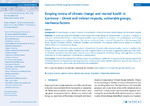Scoping review of climate change and mental health in Germany – Direct and indirect impacts, vulnerable groups, resilience factors
Gebhardt, Nadja
van Bronswijk, Katharina
Bunz, Maxie
Müller, Tobias
Niessen, Pia
Nikendei, Christoph
Background: Climate change is a major threat to human health and has direct and indirect impacts on the human psyche.
Methods: To assess the state of knowledge on the impact of climate change on mental health in Germany, a scoping review was conducted for the focus topics extreme weather events, temperature increase, intra-psychological processing, sociological aspects and resilience factors. Ten studies met the inclusion criteria of the searches in the databases Academic Search Complete, CINAHL, PubPsych, PubMed, and PsychInfo. The majority of the studies looked at correlative relationships in a cross-sectional design.
Results: There are indications of an accumulation of psychiatric disorders after extreme weather events; in addition, the risk of suicide increases with higher temperatures and it appears there is an increase in aggressive behaviour. The majority of people surveyed in Germany report concerns about the consequences of climate change, although these currently rarely lead to clinically significant impairments in mental health.
Conclusions: Overall, the evidence for Germany must be classified as insufficient. In addition to the absolute priority of climate protection (mitigation) by reducing emissions, there is a particular need for additional research with a focus on vulnerable groups and possibilities for prevention and adaptation.
This is part of a series of articles that constitute the German Status Report on Climate Change and Health 2023.
Dateien zu dieser Publikation

